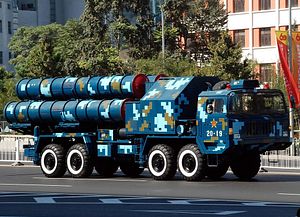The U.S. is claiming that China conducted a “non-destructive” anti-satellite test last week.
Both Space News and the Associated Press are reporting, citing the U.S. State Department, that China conducted a non-destructive anti-satellite test last Wednesday.
In an email to Space News, the State Department called on China to refrain from conducting anti-satellite tests.
“We call on China to refrain from destabilizing actions — such as the continued development and testing of destructive anti-satellite systems — that threaten the long term security and sustainability of the outer space environment, on which all nations depend,” the State Department said, according to Space News. “The United States continuously looks to ensure its space systems are safe and resilient against emerging space threats.”
Back in 2007, China shot down one of its defunct weather satellites. That test is believed to have used the ground-based, medium-range SC-19 ballistic missile to shoot down its Fengyun-1C weather satellite. Some foreign analysts also believe that China conducted an anti-satellite test in May 2013 as well. Beijing claimed that test was of a scientific rocket.
As The Diplomat previously reported, China’s state media carried reports last week announcing that China’s military had conducted a test of “land-based anti-missile technology experiment.” The reports, which cited China’s Ministry of Defense, said that the test had been successful.
The reports in China’s media indicated that the test was of a ballistic missile defense system. For example, Xinhua—after reporting the latest successful test—noted that Beijing had previously “completed two mid-course land-based missile interception tests.” The same report noted that China was seeking to acquire the “ability to intercept incoming warheads such as ballistic missiles.”
If the U.S. intelligence is accurate, however, it appears that test was actually of an anti-satellite weapon. As The Diplomat noted in its report last week, the technologies for anti-satellite and ballistic missile defense systems are highly similar. For example, China is believed to have used a SC-19 missile for some of its past anti-ballistic missile as well as its direct-ascent anti-satellite (DA-ASAT) tests. Regardless of the precise missile employed, ballistic missile intercepts and anti-satellite missiles both use hit-to-kill technologies to accomplish their missions.
However, China has previously handled its ballistic missile defense and anti-satellite tests differently for public relations purposes. Specifically, it has usually been forthcoming in announcing its ballistic missile defense tests while it has sought to cover up its anti-satellite tests, either by not announcing them or by claiming that they were non-military scientific tests.
Portraying an anti-satellite test as a missile defense one therefore suggests that China is increasingly conflating these two types of missions. This is reflected by the rhetoric of some Chinese military analysts. For example, Wang Ya’nan, deputy editor-in-chief of Aerospace Knowledge magazine, told Bloomberg News last week: “It’s true China wants to grasp anti-satellite techniques and enhance missile-defense capabilities, and it did conduct some successful tests.” Similarly, Yue Gang, a retired colonel in the People’s Liberation Army’s from General Staff Department, told Bloomberg: “The anti-satellite and missile defense technologies have steadily improved and can now manage to intercept missiles in flight.”

































